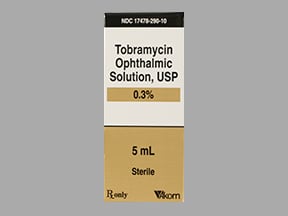
Tobramycin Coupons & Savings Card – Discount Prices from $6.81
Generic for: Tobrex, Tobi, Tobi podhaler
My prescription
Edit
5ML of 0.3%, Tobramycin (1 Bottle)
Select pharmacy

CVS
$20.51
COUPON PRICE
Walmart
$6.81
COUPON PRICE
Walgreens
$8.24
COUPON PRICE
Albertsons
$8.94
COUPON PRICETobramycin savings card
Show this card to your pharmacist
Walmart
$6.81
BIN
ID
PCN
GRP
015995
LHKPW535690
GDC
DR33
Powered by
More prescriptions for eye infection
More prescriptions for eye infection
Price history for Tobrex (brand) & Tobramycin (generic)
1 Bottle, 5ML of 0.3%
Average retail price for Tobrex
Average retail price for Tobramycin
Average SaveHealth price for Tobramycin
Our price history data is based on aggregated prescription data collected from participating pharmacies in America. Our prescription data updates daily to reflect the latest price changes. If you notice a missing data point, it means there wasn't sufficient data available to generate a monetary value for that date.
We analyzed Tobramycin prices for (5ML of 0.3%, 1 Bottle) over the last 12 months. The average retail price was $24.74, while the average price using the SaveHealth discount card was $10.94. That's a savings of approximately 55.78% when using our Tobramycin coupon.
Compared to the generic version, Tobrex had an average price of $346.14 over the same time period. With the SaveHealth savings card, Tobramycin is 96.84% cheaper on average than Tobrex.
*Retail prices are based on pharmacy claims data, and may not be accurate when we don't have enough claims.
Tobramycin dosage forms
Dosage Quantity Price from Per unit 1GM 1 Bottle $95.19 $95.19 1GM 2 Bottles $209.37 $104.69 1GM 3 Bottles $323.55 $107.85 5ML of 0.3% 1 Bottle $8.82 $8.82 5ML of 0.3% 2 Bottles $15.15 $7.58 5ML of 0.3% 3 Bottles $24.75 $8.25
| Dosage | Quantity | Price from | Per unit |
|---|---|---|---|
| 1GM | 1 Bottle | $95.19 | $95.19 |
| 1GM | 2 Bottles | $209.37 | $104.69 |
| 1GM | 3 Bottles | $323.55 | $107.85 |
| 5ML of 0.3% | 1 Bottle | $8.82 | $8.82 |
| 5ML of 0.3% | 2 Bottles | $15.15 | $7.58 |
| 5ML of 0.3% | 3 Bottles | $24.75 | $8.25 |
